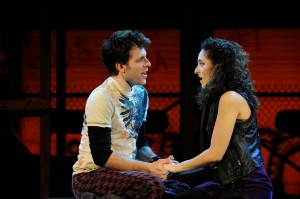
Jonathan Larson’s Rent has become something of a sacred cow in modern musical theater. Its opening in 1996 was almost eclipsed by its author’s death, and Rent cemented its place in the American Musical canon regardless of its objective merits. Easily dismissed as a reboot of Hair, Rent was actually a logical culmination of Larson’s previous, often stellar work, and Puccini’s La bohème was fertile ground for modern allegories concerning all of the things that concern struggling artists and struggling lovers and artists who struggle to love each other. The primary focus of Rent, however, is often lost in the throughline of HIV/AIDS and how these characters trudge through life while anticipating death. In the waning years of the 20th Century, Rent picked up the gauntlet tossed down by Angels in America and became untouchable.
Over the years, however, the social context of Rent has a little more perspective and we’re left to distance ourselves from the importance of the work and focus more on the musical itself. Everyone who writes about the show prefaces their comments with “Rent is not for everyone …” But that’s no longer true because the show is not in any way controversial. What many do not like about Rent is the blandness of many of the musical numbers and the often huge leap that one needs to make in order to care anything at all about these characters. Yes, Rent is very much like Hair, but, in some crucial areas, lacks the soul and the killer songs that make the original tribal love rock musical both dated and timeless. In fact, the real residing theme that comes out of Ocean State Theatre Company’s current production is not the struggle with death in the face of poverty, but of the Bohemian principles of love and art over hatred and commerce. Worthy principles and clearly defined, but even Moulin Rouge managed to nail that theme without dividing audiences so cleanly. Even the most jaded 1-percenter can step into that theater in Warwick and decide to adopt this entitlement-riddled ragtag family for three hours, but try as we may, it’s very hard to truly care.
That is not to say that this particular production of Rent is not enjoyable in most places. The cast is mostly stellar and the overall ensemble work is tight. Esther Zabinski’s musical direction is crisp, and as bland as some of the material may be, the orchestra delivers with energy and precision, making the few bright moments shine clearly. Weston Wilkerson’s lighting design is judicious and clean where he could have been mired in flashy rock-musical trappings. His use of moving lights and special effects was discrete and appropriate. Kimberly Powers’ urban playground of a set, complete with strategic graffiti and a burned out muscle car that everyone was hoping would actually move, skirt the edges of 80s music video, but in a way that seems appropriate rather than misguided. Lastly, Ryan McGinty handles the thankless chore or reinforcing a rock musical with aplomb. Minor feedback and the occasional muddy vocal aside, the sound is clean, although less dialogue reinforcement may have allowed us to see these characters as real people rather than projected images.
The cast has been carefully plucked to do justice to what fans of the show would expect. Dan McInerney is perfectly matched to the almost cartoonishly nebbish Mark Cohen and has all of the requisite vocal prowess. Janet McWilliams’ Maureen is a delight and her show-stopping “Over the Moon” captured the perfect dichotomy of bad art and political passion. Her chemistry with the similarly excellent Kendra Payne (Joanne) helped bring some warmth to the proceedings, but the truly standout pair of this ensemble is Antonio Tillman’s Angel and Damron Armstrong’s Tom Collins. “You Ok, Honey” and “I’ll Cover You” are perfect in their tenderness and simplicity, in contrast to numbers such as Mimi’s “Out Tonight,” which are embarrassing in their reach and delivery (Nora Fox’s Mimi fares better in more vulnerable outings such as “Without You,“ but her costuming still left her somewhere between movie prostitute and 80s costume party).
There are many other numbers that work well – “Take Me or Leave Me” showcases not only great performances by McWilliams and Payne, but some excellent choreography by MK Lawson. “La Vie Boheme” best utilizes the considerable talents of this cast while the show’s mainstay, “Seasons of Love,” flounders around the periphery. It’s nobody’s fault but Larson’s, as unpopular as it may be to say that. In the end, for this all to work, we must engage with and truly care about these people, but, with a few small exceptions, we don’t. To paraphrase Larson himself, we can buy a ticket and rent some emotion for a few hours, but we won’t own it.


